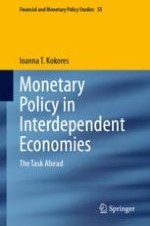2023 | OriginalPaper | Buchkapitel
6. A Critical Assessment of the Euro Project in Retrospect
verfasst von : Ioanna T. Kokores
Erschienen in: Monetary Policy in Interdependent Economies
Verlag: Springer Nature Switzerland
Aktivieren Sie unsere intelligente Suche, um passende Fachinhalte oder Patente zu finden.
Wählen Sie Textabschnitte aus um mit Künstlicher Intelligenz passenden Patente zu finden. powered by
Markieren Sie Textabschnitte, um KI-gestützt weitere passende Inhalte zu finden. powered by
